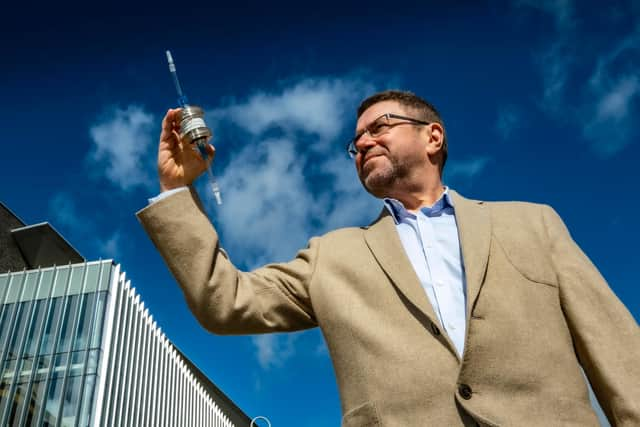Funding injection for Edinburgh Uni spin-out that could revolutionise early diagnosis of difficult-to-detect cancers
and live on Freeview channel 276
University of Edinburgh spin-out business BioCaptiva has raised more than £1 million in seed funding from Edinburgh-based business angel investment syndicate Archangels and Scottish Enterprise to further develop its technology.
The firm has developed a medical device that captures circulating free DNA from the blood of patients in much greater quantities than the current standard of a single blood draw can, overcoming a significant current limitation of cancer liquid biopsy testing. Named BioCollector, it works alongside a standard apheresis machine, filtering the DNA from the patient’s blood system.
Advertisement
Hide AdAdvertisement
Hide AdThe technology is based on a decade of research at the University of Edinburgh, led by Tim Aitman, director of the Centre for Genomic and Experimental Medicine, and Mark Bradley of the university’s School of Chemistry. Both researchers are co-founders and directors of the new company.


To prepare the company for the next stage in its development, BioCaptiva has appointed Frank Armstrong as non-executive chairman and Stephen Little as a non-executive director.
Bosses said that prototypes of the device had indicated the potential to detect early-stage cancers in patients without the need for a surgical biopsy and “promising new approaches” for monitoring and detecting disease recurrence which is not currently possible. This should mean it is possible to gain deeper insights into tumour biology resulting in better patient outcomes.
Should the technology prove successful, the firm plans to scale up its technology ahead of regulatory clinical trials, scheduled for completion during 2024.
Advertisement
Hide AdAdvertisement
Hide AdThe seed investment will enable the business to “in-license” the technology and carry out its first trials to prove its safe use in humans. BioCaptiva has been launched with the support of Edinburgh Innovations, the University of Edinburgh’s commercialisation service.
Jeremy Wheeler, chief executive of BioCaptiva, said: “The BioCollector is a disruptive technology which will be transformational for liquid biopsy testing. We are confident that this platform technology can make a significant impact in this important area and, ultimately, enable cancers to be detected more quickly and accurately, enabling patients to receive precision cancer treatment as early as possible.”
Sarah Hardy, director, head of new investments at Archangels, said: “BioCaptiva has the potential to provide pharma companies and clinicians with high levels of circulating free DNA from individual patients that could revolutionise the way some cancers are detected.
“This has the potential to vastly increase the sensitivity and applicability of liquid biopsy for detection of cancerous tumours which are often diagnosed too late to enable specific treatment options to improve outcomes.”
Advertisement
Hide AdAdvertisement
Hide AdThe market for the firm’s technology is said to be “significant”, running into the billions of dollars globally.
Aitman of the University of Edinburgh added: “BioCollector will provide a step change in the capabilities of liquid biopsy for cancer detection and diagnosis. We are excited to be moving our device into this market with its huge potential for advances in the care of patients with cancer.”
A message from the Editor:
Thank you for reading this article. We’re more reliant on your support than ever as the shift in consumer habits brought about by coronavirus impacts our advertisers. If you haven’t already, please consider supporting our trusted, fact-checked journalism by taking out a digital subscription: www.scotsman.com/subscriptions
Comment Guidelines
National World encourages reader discussion on our stories. User feedback, insights and back-and-forth exchanges add a rich layer of context to reporting. Please review our Community Guidelines before commenting.